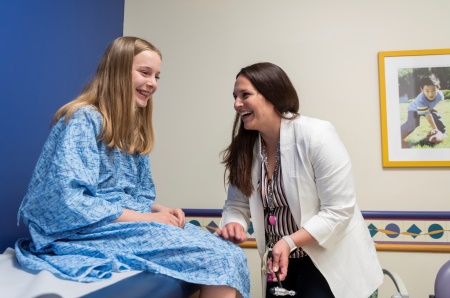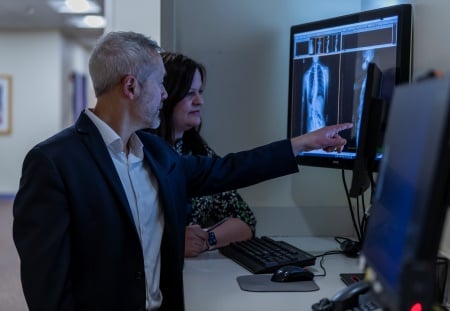Spine Surgery: What to Expect
Spine surgery is a very complex operation and can affect many body systems. Because of this, you will be scheduled to meet with some of our specialists prior to your surgery in order to assure that we have a personalized plan in place for your child on their surgery day.
Appointments before surgery

Before surgery, your child may need some or all of the following appointments and tests. We will make every effort to coordinate scheduling for you to accomplish as much as possible during each visit.
- Pulmonary Function Test – measures how much air your child can breathe in and out
- Echocardiogram (Echo) – a test that shows how the heart is working. Usually requested if your child has a history of heart problems or a curve greater than 80 degrees.
- Pre-Admission Testing – visit with an anesthesiologist and nurse practitioner to discuss your child’s health history, options for anesthesia and pain management after surgery.
- Pre-operative Discussion with Orthopedics – your surgeon will finalize plans for your child’s surgery and answer any questions you have. The surgery team may take photographs and do a set of imaging studies, which includes x-rays, MRI and a CT of your child’s spine.
- Lab Work – your child will need to have their blood drawn at their pre-operative appointment, as well as the day before surgery.
Your child’s surgeon may require additional appointments or testing, depending on your child’s unique medical needs.

Preparing for surgery
You can find information about preparing for surgery in the Children’s Mercy Guide to Surgery.
Your orthopedic care team will also discuss important ways you can prepare for surgery, including:
- Infection prevention with chlorhexidine wipes and Mupirocin ointment
- Bowel preparation with Miralax to help with post-operative constipation
- Skin care to clear up any rashes or acne before surgery and regular sunscreen use to prevent sunburn
- Good hygiene to maintain overall health before surgery – certain illnesses such as respiratory infections, tooth abscesses and skin infections may require your child’s procedure to be rescheduled
The day before surgery
You can expect to have lab work done once again on the day before surgery. This is to be sure we have the appropriate blood product available if your child needs transfusions during surgery for any reason. Your provider will instruct you to go to Children’s Mercy Adele Hall Campus Outpatient Laboratory for this blood draw.
The day of surgery
You will arrive early in the morning, usually around 6-7 a.m., to the Same Day Surgery area of the hospital. After you meet with your child’s anesthesiologist and surgeon, they will make sure your child is comfortable and take them back to the operating room.
Parents and caregivers can wait in the Surgery waiting room or the Ronald McDonald Room—just let the staff know where you will be so they can make sure you receive updates from the surgical team throughout the procedure.
Recovery from surgery
The surgery team will bring you back to see your child as soon as they are awake and ready. They will either be in the Recovery Room or the Pediatric intensive Care Unit (PICU) for the rest of that day and in some cases, overnight.
You can expect your child to be in the hospital for 2 to 3 days after surgery, but this may vary depending on your child's health history. We will help your child regain some of their strength and function before they return home.
Recovery in the hospital will include:
- Lung function exercises to prevent lung and circulation complications
- Physical therapy beginning the first day after surgery to gradually progress towards walking (or transferring to a reclining wheelchair if your child does not walk due to a neuromuscular condition)
- Incision care
- Gradual return to eating, drinking and using the bathroom normally
Recovery at home:
- Your care team will provide you with a timeline of your follow-up visits and guidelines for caring for your child and when they can return to various levels of activity after surgery.
Below are discharge guidelines:
Keep the incision clean and dry. Most children will have dissolvable sutures that will absorb as they heal. These sutures do not have to be removed. There may also be a special type of glue over the incision that will wash off over time.
Your surgeon will instruct you on when to remove your dressing. You can wash the incision with soap and water once the dressing is removed. Do not scrub the incision or put ointments on it.
Watch for any redness, swelling, tenderness, warmth, drainage, sores, foul odor, or opening or separation of the incision. For one year after surgery, be sure to apply sunscreen of at least 30 SPF before your child goes into the sun.
Smoking will interfere with bone healing. There should be no smoking in the house where your child lives. All smoking should be avoided. Being around smoke can delay wound healing after surgery and can increase the risk of your child’s spine not healing. This can increase the chance of the rods breaking and also lead to lung infections.
Your child should have sponge baths until their dressing is removed, which will likely be after they return home. After the dressing is removed, they may shower normally. They should not immerse the incision in water (bathing or swimming) for at least 2 to 3 weeks after their surgery.
Encourage your child to eat a well-balanced diet that includes a variety for foods. Until your child’s appetite returns to normal, encourage high calorie foods (dairy products, meats, eggs, Carnation Instant Breakfast, Boost shakes, etc). Encourage fluids (water and fruit juices) and a high fiber diet (fruits, grains, vegetables) to help prevent constipation.
If your child is not getting enough fluids, they may feel dizzy. To prevent this, have your child drink lots of fluids. If your child is fed through a g-tube, resume home feeding schedule as tolerated.
Give any pain medications as directed by your child’s doctor. Giving pain medication 20 minutes before your child is active may help decrease discomfort. Pain medication will gradually be needed less as your child recovers.
Discuss the use of additional acetaminophen (Tylenol) or ibuprofen (Advil/Motrin) after surgery with your orthopedic team.
There are ways to help with pain besides medicine. Help your child relax by taking deep breaths or listening to soothing music. Read a book or watch movies to distract them from their discomfort.
Taking a stool softener or laxative along with pain medications may help prevent constipation and discomfort. We recommend taking a daily stool softener or laxative until they are done taking pain medications.
Your child will become tired very easily in the first few weeks after coming home from the hospital.
Your child may be very uncomfortable and need help getting around.
Encourage your child to move slowly when getting up. Avoid sudden movements and do not allow your child to bend or twist their back.
Encourage your child to slowly increase their daily activities. This includes sitting a little longer in a chair or walking a little farther each day.
Encourage frequent rest periods during the day.
Have your child stand slowly and adjust to any changes in balance before walking.
Children or teens with conditions that do not allow them to walk should be positioned in a reclining wheelchair. Elevate the head of the chair as tolerated.
Please talk with your orthopedic team before starting a new activity! Your child should not do anything that will cause more than just a little pain.
Depending on your surgeon, your child may be scheduled for physical therapy after surgery.
Motions that make your child twist, bend at the waist, or are jarring may hurt at first. Encourage your child to bend their knees to stoop or reach something on the floor. This way, they use their leg muscles rather than their back muscles.
Your child should spend time doing school work at home as they are able. This will keep them from falling behind. Every child is different and should return to school at their own pace. Most children go back to attending school between 3-6 weeks after surgery. It may be better to return to school gradually, such as attending for a half day at first, then slowly increasing their time until they are there for the full day.
It’s important that your child avoid any heavy lifting. If your child’s book bag is too heavy, they should have a friend carry it for them. Your orthopedic team can also provide a note for two sets of books, one at home and one at school, to lighten their load.
Your child should remain out of gym class or school sports after surgery until their surgeon clears them to return.
Tell your child’s dentist or orthodontist about their spinal surgery. It is important that they know about the implants that were placed during surgery. Some dentists prefer to give antibiotics before oral procedures in patients that have spinal implants in place. Our spine surgeons do not recommend preventative antibiotics before dental procedures done after spine surgery, but do not discourage dental providers from giving them if they feel it is necessary.
- Spine Care
- Bracing Options for Scoliosis
- Growing Rods
- Halo Gravity Traction
- iSpine Clinic
- Mehta Casting
- Microdiscectomy for Disc Herniation
- Outreach Services
- Spinal Fusion
- Spine Care Consultations
- Spine Surgery: What to Expect
- Spondylolysis and Spondylolisthesis
- Vertebral Body Tethering
- Meet the Team
- Orthopedics
